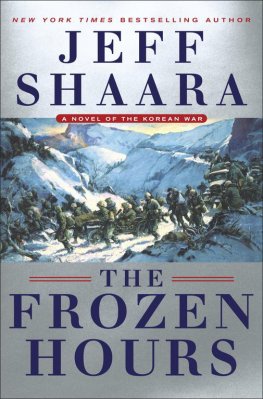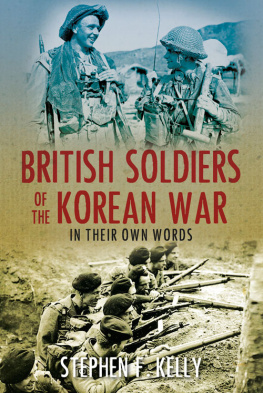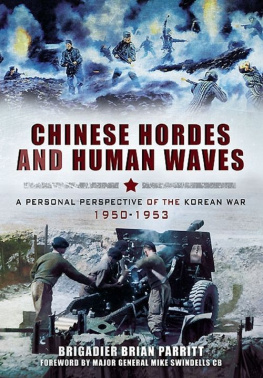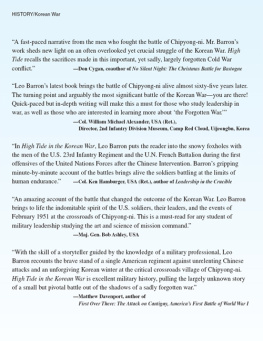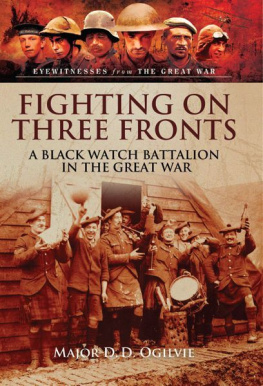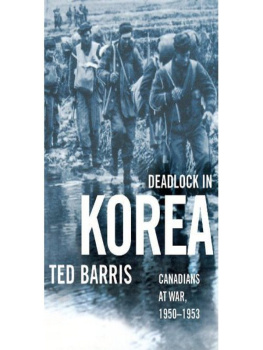FORTUNE FAVOURS
THE BRAVE
By the same author
The March on Delhi
Suez: The Seven Day War
Eritrea 1941
The Neglected War: Mesopotamia 19141918
Townshend of Kut
The East Yorkshire Regiment
The Civilising Mission
The Vainglorious War
Behind Barbed Wire
Principles of Small Arms
German Infantry Weapons of World War 2
British and American Weapons of World War 2
Russian Infantry Weapons of World War 2
FORTUNE FAVOURS
THE BRAVE
The Battle of the Hook
Korea 195253
BY
A. J. BARKER
First published in Great Britain 1974
Reprinted in this format 2002, and reprinted 2009 by
Pen & Sword Military
an imprint of
Pen & Sword Books Ltd,
47 Church Street, Barnsley, South Yorkshire S70 2AS
Copyright A. J. Barker, 1974, 2002, 2009
ISBN 978 0 85052 823 7
A CIP catalogue record for this book is available
from the British Library
Printed in Great Britain by
CPI Antony Rowe, Chippenham, Wiltshire
by Major-General Sir Douglas Kendrew, KCMG, CB, CBE, DSO,
Commander 29 Inf Bde 195253 Korea
I am glad to have this opportunity of writing a short foreword to Lt.-Colonel Barkers story of the Battle of the Hook that took place in Korea during the end of May, 1953.
It gives me the chance to pay tribute to a wonderful Brigade consisting of the 1st Bn The Black Watch, 1st Bn The Kings Regiment, 1st Bn The Duke of Wellingtons Regiment and the 20th Field Regiment Royal Artillery, with other supporting arms.
All the Bns played their full part in this battle; however the main attack fell on the Dukes and their fighting qualities were outstanding.
This battle was unique in many ways. Not since the trench warfare of the 191418 war have British forces fought a battle of this pattern, and it is unlikely that it will be fought again with the advent of tactical nuclear weapons.
Artillery played more than a major part in the planning of the defence. Great praise must be given to Lt.-Colonel Geoffrey Brennan who, with his Counter Bombardment officers, executed the fire plan and so decimated the attacking Chinese that the Infantry survived the waves of men who tried to overrun this key position.
I must also pay tribute to the National Servicemen that made up sixty per cent of the Regular Battalions. These young men, mostly nineteen years old, adapted themselves to the art and hell of war and played a full part in writing their Regiments histories. Many of the platoons were led by National Service officers.
But in writing this foreword to the story of a vital battle, I do not forget the other units and formations in the Commonwealth Division who maintained to the full the highest traditions of British Forces, and thus made us proud to belong to a unique band of men who were fighting to uphold the ideals of freedom.
In the closing stages of the Korean War some twenty divisions were fighting in defence of the principles of the Charter of the United Nations on the 38th Parallel. Of these, one was the Commonwealth Division which held a front separated from the sea to the west only by a division of the United States Marine Corps. The commander of that division had once said in a voice of respect, You know, I have the sea on my left flank and the Commonwealth Division on my right, and when I go to bed at night I sleep well because I know that when I wake up in the morning theyll both still be there.
Two pivotal bastions of defence formed the cornerstones of the Commonwealth Divisional front the massive Pt 355 ridge, whose peak was so hard that dug-outs on it had to be blasted out with explosives, and Hook ridge. Both features were coveted by the Communist forces, and the Hook, that tenuous angled spearhead of a whole stretch of front, saw more British blood spilled on its sides, and a greater concentration of Chinese and North Korean blood on its face, than any battlefield on the Korean peninsula.
In all there were some five battles for possession of the Hook, of which three are remembered. The first was fought on the night of 26/27 October, 1952, by the 7th United States Marine Regiment under most unfavourable conditions. The second and most costly in casualties was fought on the night of 18/19 November, 1952, by the 1st Battalion, The Black Watch, who were also holding the Hook for the prelude to the third battle. This action, the brunt of which fell on the 1st Battalion, The Duke of Wellingtons Regiment, stands as the last major feat of arms to have been fought by any British unit. Beside it such actions as Suez or Borneo were very small beer for the units taking part. As a result of it, awards were made of two Distinguished Service Orders and half a dozen Military Crosses and Military Medals. The Third Battle of the Hook was a protracted affair of wiring, mining and bunkering, of mortaring, shelling and air-strikes, and of steady persevering defence by patrols, tunnelling and trench work. It came to a climax on the night of 28/29 May, 1953, when greater concentrations of artillery were brought to bear on a 1000-yard front than at any time since 1918. Several battalions of Chinese were broken on the Hook that night, and The Dukes mainly National Servicemen from Yorkshire suffered relatively heavy casualties themselves. But they did not budge, and in the morning they still held the Hook. Fortune had favoured the Brave. At the dawn of a new Elizabethan era, this resounding victory showed the world that the British Lion was not as yet decadent.
When the Korean War broke out in 1950 the Western world was ill-informed about Korea. And, although British, Turks, Belgians, Greeks and Frenchmen were soon fighting in its defence beside the more numerous Americans, interest in this conflict rarely went beyond bewildered apprehension that an East-West test of power was going on in a remote and misty land. Coming so soon after the Second World War, the conflict seemed an anticlimax, and leader writers have often referred to it as the forgotten war. In Britain, still grappling with food rationing and power failures and preoccupied with the birth of the Welfare State, the last thing anybody wanted to hear about was a war even a war sponsored by the United Nations against an act of unprovoked aggression. Britain contributed more military assistance than the score of other countries who supported the United Nations bid to uphold the rule of law. But this was only because it had not yet occurred to anybody that she was no longer a Great Power.
Like the war in Vietnam, the Korean War was the fruit of the American policy of global containment. In 1945, as part of a Russo-American arrangement to accept the surrender of Japanese forces in the country, Korea was divided at the 38th Parallel. In the south the Government of the Republic of Korea although neither a perfect democracy nor wholly pacific in its temper was recognized by the United Nations General Assembly as the only valid government in the country. In the North the Soviet-sponsored state known as the Democratic Peoples Republic of Korea was recognized by the Communist powers.
On 25 June, 1950, North Korean troops crossed the 38th Parallel; four days later they were in Seoul. On this occasion the United Nations acted swiftly, calling for a cease-fire and the immediate withdrawal of the Norths forces. When this demand was ignored, American troops under the flamboyant General Douglas MacArthur were sent to support the armies of the South. The first two months of the war were marked by communist victories, and by August the defenders were hemmed in round Pusan. Primarily as a consequence of a daring and successful sea-borne attack on Inchon, MacArthur was back in Seoul by the end of September. Instructed by the U.N. General Assembly to secure stability throughout Korea he now moved across the 38th Parallel in pursuit of the fleeing North Koreans.


